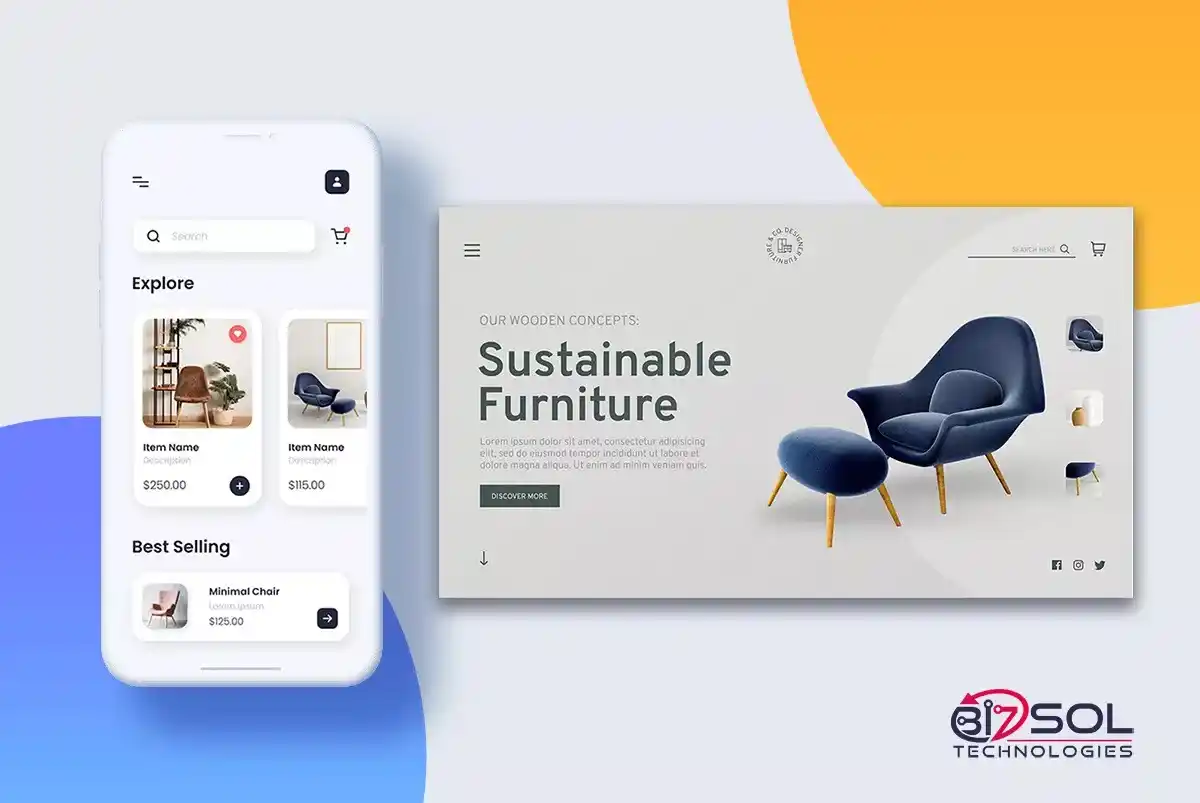Consumer Internet usage has evolved significantly in recent years, with mobile devices now outpacing PCs in terms of usage. The average amount of time that people spend online each day, globally, has declined from 43 minutes on the desktop in 2011 to 32 minutes in 2021, with a further decline predicted through 2022, and has climbed from 33 minutes on mobile in 2011 to 106 minutes in 2021, according to Statista.
Building an online presence is one of the most crucial components of a company since it allows you to reach your clients with your goods and services. However, choosing where your company presence should be given the wide range of platforms available especially with the rising popularity of smartphones is a crucial choice.
Mobile app and website
An application created especially for a mobile device, such as a phone or tablet, is called a mobile app. It occasionally works with features already included in the phone, such as GPS.
A solution to a no-code website builder is a web app, which is software that can be accessed through any browser but is specially written. A link may occasionally be stored on a mobile device’s home screen such that it seems to be an app but instead opens a browser when clicked, as is the case with Progressive Web Apps. It has a user interface that resembles an app and saves as a desktop shortcut.
Websites currently make up less than half (45%) of total online time spent by users, with mobile applications making up the remaining 55%, according to statistics on Internet usage. The use of mobile devices has grown, which has increased the demand for mobile apps.
Because they retain a greater retention rate than Web sites, mobile apps have become a crucial component of the business strategy of organizations that wish to communicate with their clients online. Google claims that the retention rate for mobile app users is 50% greater than for browser users and that this ratio rises to 90% when solely taking into account smartphone users.
Advantages mobile apps
There are several advantages to developing an application for your business.
Offline usage
An incredible feature offered by a mobile app is offline mode. You should think about developing a mobile app for your company if you anticipate that users may access some services without a connection to the internet. Many users will be glad to keep using the app when traveling by metro, rail, bus, or high in the mountains.
Because of this, apps are far more adaptable than websites, enabling them to reach more people and perhaps boost revenue. When a user’s Internet connection malfunctions while they are on a website, the website does not work correctly.
User experience
Users of mobile applications can frequently move across a whole app in a way that seems natural to them.
Mobile apps provide a distinctive user experience. The user can interact with an app more closely than they can with a website, and the fact that an app is being developed for a specific platform gives UI/UX designers more freedom to express their creativity when designing an app. Mobile applications are more user-friendly. Mobile applications can track user behavior, which helps them become more user-friendly in the future.
Monetization
Due to the fact that users can make purchases or pay subscription fees to access particular features or content, mobile apps are typically more profitable for brands than Web sites. While sales on websites are typically restricted to one-time purchases, subscription-based revenue is a common source of recurring revenue for apps.
Custom push notifications
Apps for mobile devices are ideal for brand promotion. For instance, you may utilize push notifications to let clients know about new and intriguing business developments, and provide discounts (like Costa Coffee), and other things (like IKEA and its AR-based app).
Push notifications are a feature that users may configure in their mobile applications to personalize them and enable companies to notify customers of any modifications to their products or services. Brands don’t have to worry about sending out email or text messages to efficiently and rapidly distribute fresh information because such alerts show up on the user’s device as soon as the device gets them.
Capability
Websites are not as capable of utilizing device features as mobile applications are. It lacks access to devise hardware, which results in a variety of platform-specific restrictions.
For example, you won’t be able to access push notifications, Siri, Face ID, Touch ID, ARKit, Bluetooth, or battery information on an iOS website. You cannot use the calendar on Android, and calls and SMS are blocked.
Advantages of website
Websites also offer some unique advantages to businesses over mobile applications.
Ease of access
Anyone may visit a website, regardless of whether they have access to mobile technology, which is the first and most significant advantage of having a website rather than a mobile app. Additionally, Web sites are accessible online even when a user’s cellular coverage is unavailable and don’t require users to download an app in order to utilize them.
Compatibility
You may allow your customers to access the website from any device and on any platform of their choosing (iOS, Android, etc.). No extra installation is necessary. Every time a user updates the operating system or browser on their device, they must also update their apps. This procedure can be expensive and time-consuming.
Control and customization
Making websites suit your branding is simple. You won’t need to employ a developer every time you want to make changes, which may be expensive, because websites are also simpler to update.
Updates may also make a website appear really slick and attractive. We always have the most recent version of the website available thanks to server code updates. This procedure is more difficult for mobile apps since it calls for user intervention, Apple or Google approval, and additional processes.
Cost-effective
One of the biggest advantages of having a website is that you simply have to pay for hosting. You won’t have to spend a lot of money on hosting services because they are reasonably priced especially if your site doesn’t receive significant traffic. In contrast, a mobile app may have one-time costs as well as recurring monthly charges.
The True Cost Of Developing An E-Commerce Mobile App
Better SEO
Because it increases your exposure and increases traffic to your website, SEO is essential to its success. Compared to a mobile app, your website can be optimized for search engines considerably more rapidly and easily.
Search engines are used by every one of us to locate helpful information. These search engines frequently assist us in finding websites, but they seldom have mobile applications. It’s best to utilize a website if you want consumers to find you more quickly because websites are better optimized for search engines. Users may also share it via a link.
Because monitoring and upgrading your content on a website is absolutely free, SEO services and tools are not required.
What is best for your business?
Considering benefits and drawbacks makes it simpler to decide which option is best for your company. I would recommend having both, ideally. In such a scenario, you can easily use search engines to make your website easy to access and provide a link to download the app so that you may get closer to your consumers.
However, a mobile website is an ideal option if you want to save money and you don’t need push alerts, offline mode, or any other device-specific functionality. Remember that by 2022, mobile will rule the web, and every website should be accessible and compatible with mobile devices.
Whether you choose to utilize a mobile website, a native app, or both will ultimately depend on your aims. Think about a gaming app like angry birds as an example: The full software may be downloaded and set up on a mobile device. The greatest option if you want to create mobile games is to create apps that people can download.
In contrast, if you already have a website online, you could desire a mobile version of it that performs the same functions and even offers the same material. You may provide mobile-friendly content without creating a whole app just for that purpose.
Mobile app development is mostly done by companies to boost sales. There is no assurance that your app will be able to accomplish this, though. To clearly understand the function of your app, you must first outline your product goals before developing a mobile app strategy. Also, consider whether your particular sort of business might benefit more from having a website.
Of course, there are circumstances in which you can profit from both choices. If you already have a website before developing a mobile app, this is the best choice. Generally speaking, having a mobile web presentation first is the most natural sequence of events when it comes to developing your mobile/online presence.
Then, you can provide a mobile app to your consumers as a supplemental, practical application they may use for particular tasks that they might not otherwise be able to do with a conventional Internet browser.



